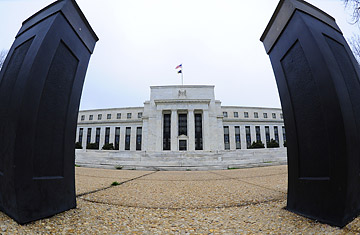
The U.S. Federal Reserve building
The market continues to stage an improbable rally which should have been affected by concerns about the spread of the Swine flu virus and the fact that several large American banks may need tremendous infusions of capital. GDP numbers issued by the government were also shockingly bad. The economy contracted 6.1% in the first quarter which was more than any of the estimates of sane analysts. This GDP drop followed a drop of 6.3% in the last quarter of 2008. Experts tried to calm the masses by saying that some of the fall-off was due to a dip in inventories. That could mean that as those inventories are replenished in this quarter, economic activity will pick up. The logic is circular to the extent that a poor GDP figure is a sign that the economy may not pick up and hence, inventories will not be replaced.
One of the reasons that GDP did so poorly is that capital expenditures fell at an annual rate of 38%. A fair portion of that drop was due to slow activity in the housing market. Recent figures on home sales should cause any capable analyst to believe that housing will not be a source of any hope for a recovery.
See the world's most influential people in the 2009 TIME 100.
After the GDP numbers were released, the Fed put out the minutes of its two-day Federal Open Market Committee. At the core of the statement was one of the greatest hedges in recent memory:
"The Committee continues to anticipate that policy actions to stabilize financial markets and institutions, fiscal and monetary stimulus, and market forces will contribute to a gradual resumption of sustainable economic growth in a context of price stability."
It is the Fed's way of saying, in terms that are hardly subtle, that if its programs to improve the credit markets, the Treasury's plans to help banks and the auto companies, and the Administration's budget and stimulus package works, then the American economy will walk away from the worst recession in memory. It is a preposterous statement which implies that, left alone, the financial health of the country would be in ruins. The sole salvation of the production, housing, and employment sectors of the United States rests in very few hands, all of them in Washington. (See pictures of the global financial crisis.)
On the other side of the statement of the Fed is a prospect which, far from being immodest, should cause every intelligent person in the country to shudder. If the great engineers of the plans to return the economy to health are wrong, the result will be a ship wreck, a catastrophe so large that it cannot be contained, no matter how much money the government is willing to invest.
The vanity of the Fed, the Treasury, and those building the budget in Congress and the Administration is not that they refuse to doubt that the fruits of their work will remake the economy; It is that they will not admit that the economy has even the smallest chance of remaking itself. That, in a phrase, is what is at the heart of the debate over how the recession will end and why. (See pictures of the Top 10 scared traders.)
The current group of federal policy makers must think that it is mad to believe housing prices will hit a low enough level that consumers will make purchasing decisions on their own. If a home that was worth $500,000 three years ago can be purchased for $200,000 at the end of this year, it may bring buyers into the market without any aid whatsoever. If nuclear physicists can be hired at the minimum wage, they will probably all find employment. If the year drags on and the economy does not show signs of substantial improvement, the hope that the government will solve the problem will fade.
People who believed in the power of institutions like the Fed and Treasury will lose their faith and become embittered as time passes and the economy does not show signs of substantial improvement. That is a shame because it means that they will have needlessly turned their back on the concept that there is power in self-sufficiency.
— Douglas A. McIntyre
See the top 10 worst business deals of the past year.
For constant business updates, go to 24/7wallst.com.
